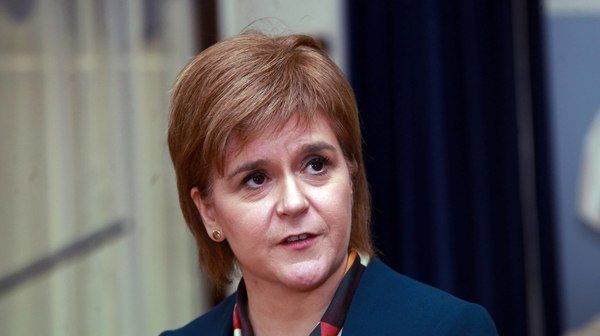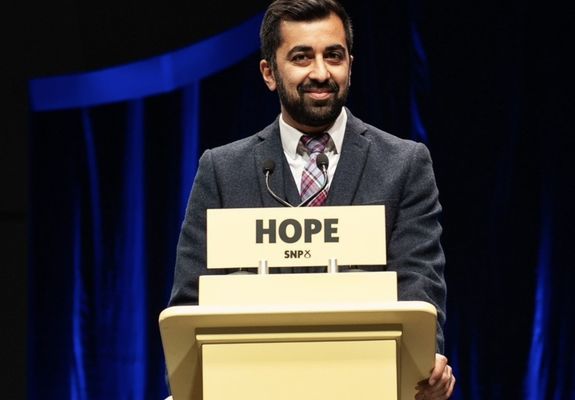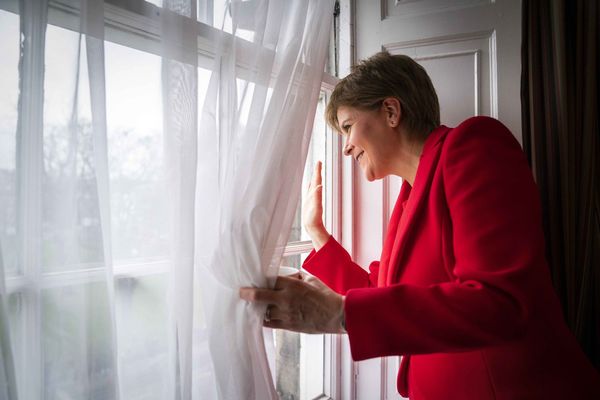THERE is a word that sums up Scottish politics: stuck.
For a long time now a great “constitutional” question has dominated public life.
But – despite what either side say or hope – it is very far from being resolved.
Unionists and nationalists are fighting a long war of attrition, with opinion polls rarely nudging far away from a 50-50 split.
Their positions are so stable some say they have calcified, turned to stone.
The pro-independence parties are not just in power, they are “stuck” there, without the legal or political ability to push through a second referendum.
Their opponents too find themselves locked in to the same arguments as they were a decade ago. In Scotland, we have the politics of a broken needle.
Out in the sunshine early this morning in Erskine ☀️
— Cllr Michelle Campbell (@CampbellSNP) April 1, 2022
Remember to vote:
SNP #1 & SNP #2
in this area to re-elect myself and @CllrNicolson
We are the only
pro indy candidates on the ballot for Erskine & Inchinnan.
Check the leaflet for more details!#VoteSNP #ActiveSNP pic.twitter.com/V6Dq8Je8bC
This is not just true of the devolved national parliament and government, but of councils too.
Next month, on the same day as the Stormont elections, voters will be asked who they think should run Scotland’s 32 unitary local authorities.
The Scottish poll is not nearly as important as the Northern Irish one. But the results will be interpreted as as a test of opinion of independence, not on how well parties manage the collection of bins or the running of schools. The future of the United Kingdom may not officially be on the ballot, but, in reality, little else is.
Pollsters have already tested the public. Their findings suggest Scotland can expect more ‘stuck’.
The SNP in particular will consolidate its hold on councils, if surveys are capturing the mood and nothing much changes in the next month.
EXCLUSIVE: BALLOT BOX SCOTLAND POLL (Part 2)
— Ballot Box Scotland (@BallotBoxScot) April 5, 2022
One month out, a (spicy, perhaps eyebrow raising) poll by Survation on behalf of BBS indicates the SNP could win record local election results, against transfer-unfriendly Conservatives.
Full analysis: https://t.co/nEDaA6dLxk
The party is currently polling at 44%, up from 32% five years ago, according to work done for Survation for Ballot Box Scotland, an independent number-crunching website.
The SNP’s main allies, the Scottish Greens, get 3%. The pro-UK Labour, Tories and the Liberal Democrats are on 23%, 18% and 6% respectively.
Alba, the vanity vehicle of former first minister and Kremlin TV personality Alex Salmond, is trailing on 1%. Is his party over? It may be if it fails to keep its councillors – all of whom are SNP defectors.
Some Labour voices, meanwhile, are hopeful they can upset the polls, especially in their traditional heartlands of the post-industrial central belt of Scotland. Why? Because the SNP’s younger voters, they hint, tend not to turn up for local elections.
Labour in staunchly pro-independence Glasgow – once its great bastion – has defied national trends in the last two local elections. It held Scotland’s biggest city against the odds in 2012 and has denied the SNP an overall majority in 2017. Nationalists, as in the national parliament, rely on Green support to rule Glasgow.
In fact, after the last elections there was no single council where any party had majority control.
We've got more candidates than ever before standing to beat the SNP in the upcoming council elections.
— Scottish Conservatives (@ScotTories) March 31, 2022
In May, it’s a clear choice between Nicola Sturgeon’s candidates and more years of distraction – or Scottish Conservative candidates to deliver local action on local issues. pic.twitter.com/NPJ6Owr0na
The SNP has another minority administration in Dundee and shares power with Labour in Edinburgh. In 2017, the party ended up in opposition in Aberdeen, Argyll and Bute, Angus, Moray and North Lanarkshire even though it was the biggest party in those areas.
Labour councillors in Aberdeen were suspended by their party because they entered in to a coalition with the Conservatives to keep the SNP out.
This, back in 2017, was as big a sign yet that Scottish politics, even local politics, was often re-aligning along constitutional lines. Because – as if this needs saying – the actual local politics of Labour and the SNP are rather similar. And the two social-democratic parties have successfully co-operated elsewhere.
North Lanarkshire is another area to watch. People outside Scotland might struggle to place this area on a map. But it occupies strategic and economically important swathes of our central belt. And it is big.
One month until local elections.
— Scottish Labour (@ScottishLabour) April 5, 2022
🚨Latest polls show only Labour can take on the SNP.
On May 5th - vote Scottish Labour for a party that will always be on your side. pic.twitter.com/HbdY8UsxT4
Like Glasgow and Dundee, it voted for independence in 2014. The SNP will be itching to take control of it. Will they? Or, as in Glasgow, will an older, more reliable Labour vote turn out?
There are other reasons to be sceptical about whether polls can be used to predict local votes. In Scotland’s Highlands and Islands there is a long tradition of independent non-partisan candidates doing well. They took 10% of the vote last time. The most recent survey, which asks about party preferences, gives them just 1%.
Allan Faulds, who single-handedly runs BallotBox Scotland, also suggests the poll may underestimate support for the Greens. “There may be a particular challenge in capturing local voting intention via national poll – we’ll find out definitively either way in May,” he said.
The council election campaign so far has been grim. It has been dominated by story after story of candidates saying stupid partisan things on social media. More evidence, perhaps, of how “stuck” Scotland is?
And the topic of various scandalous utterings on Twitter or Facebook? Well, mostly independence, of course.
Even when candidates are not committing gaffes, they are talking about the constitution. I guess they know their voters.
Nicola Sturgeon mauled over ferries fiasco at FMQs https://t.co/9ApxqtlUba
— Tom Gordon (@HTScotPol) March 31, 2022
This is a shame. There are actually rather a lot of difficult local issues to thrash out around the country. Scotland’s island communities, for example, especially those off the West Coast, have had a trying few years. There are serious issues with ferries.
An SNP attempt to shore up the fleet has flopped dramatically. There is an ongoing row about the fate of two lifeline vessels currently lying unfinished at a nationalised Clyde yard. They are years later and their price is running at twice the original budget.
Ferry rows can be baffling for people outside Scotland. To understand, take a look at a map: ours is a country of islands and peninsulas which are only economically and socially viable with good sea crossings. Islands (I should declare an interest and say I am originally from one myself) have very strong identities, sometimes even challenging Scottishness. So disconnecting them from the mainland – thanks to bad ferries – is politically and constitutionally hugely significant. Council elections may reflect this.
Some cynics say Nicola Sturgeon, who is about to overtake Mr Salmond’s record as longest-serving first minister, will be relieved by the local authority campaign. It provides a break from national criticism about ferries.
Yet there are wider issues about local government, especially its funding, which deserve more attention than it gets in a country where one issue dominates.
Opponents of the SNP argue that the party has starved councils of funds and powers as it builds the foundations of a new state in Edinburgh. Indeed, some SNP councillors will whisper the same thing.
Older voters will remember Mr Salmond won power back in 2007 promising to reform council tax. This has never happened. Partisans are still squabbling about this.
Scotland will not come unstuck in May, however the parties do.








